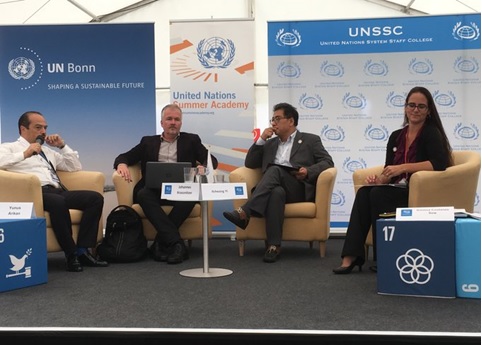
The 6th edition of the UN Summer Academy took place from 21 to 25 August 2017 on the UN premises in Bonn, Germany on the topic of “Localizing the 2030 Agenda.”
The UN Summer Academy combined plenary sessions with interactive opportunities for knowledge exchange and experience sharing, leveraging the perspectives of diverse stakeholders. It has also provided an open space for knowledge-sharing and learning opportunity called Share Fair, which is open to the wider public. The Share Fair highlights experiences and expertise of participants as they share good practices in implementing and scaling local projects and finding relevant partners.
On the first day, a panel discussion specifically addressed the challenges of the localization process.
Mr. Yunus Arikan, Head of Global Policy and Advocacy with ICLEI - Local Governments for Sustainability, highlighted that the global arena has lagged behind in terms of implementing sustainable development initiatives, while such initiatives have already been embarked upon at the local level. This is why ICLEI focuses on strategies to "scale up, multiply [and] leap-frog" local efforts to the global level.
He highlighted three factors for success:
Mr. Johannes Krassnitzer, Coordinator for the UNDP ART Initiative spoke on efforts to localise the SDGs within the UN. In particular, he stressed the importance of working at the local level and with an integrated approach because of the far-reaching impact of the 2030 Agenda. The quality of governance, especially democratic governance, can be a key enabler in transformative change. Localising the 2030 Agenda therefore involves strengthening democratic processes and establishing multi-level structures that engage all stakeholders in society.
Mr. Ilcheong Yi, a Senior Researcher with UNRISD (UN Research Institute for Social Development), then qualified what localisation of the 2030 Agenda entails. A mechanical interpretation and translation of global goals to local ones is highly problematic as this fails to reflect local realities. Also, subsidiarity has to be implemented with a solidarity bias: it is important to coordinate local goals and targets, balancing sub-national, national, and regional needs and priorities. Finally, measuring the impact of localisation requires going beyond national, aggregated indicators as units of analysis.
To build on the discussions and reflections on the concept of sustainable development and localising the 2030 Agenda, participants broke out for two rounds of AppLab sessions during the second day. The Application Labs, are an opportunity for participants to dive deeper into different thematic content and engage in more hands-on practical experience with relevant tools for implementing the 2030 Agenda.
Under the topic of Partnerships, Community Engagement and Empowerment, the tools available on the localising the SDGs platform were shared. Participants also discussed multi-actor partnerships in terms of the various initiatives implemented in partnership between local and regional governments and the UN, as well as the process made in the localisation of SDGs.
Some key takeaways of the summer academy are:
For full report of each day and photos, visit https://storify.com/UNSSCBONN/

Comments